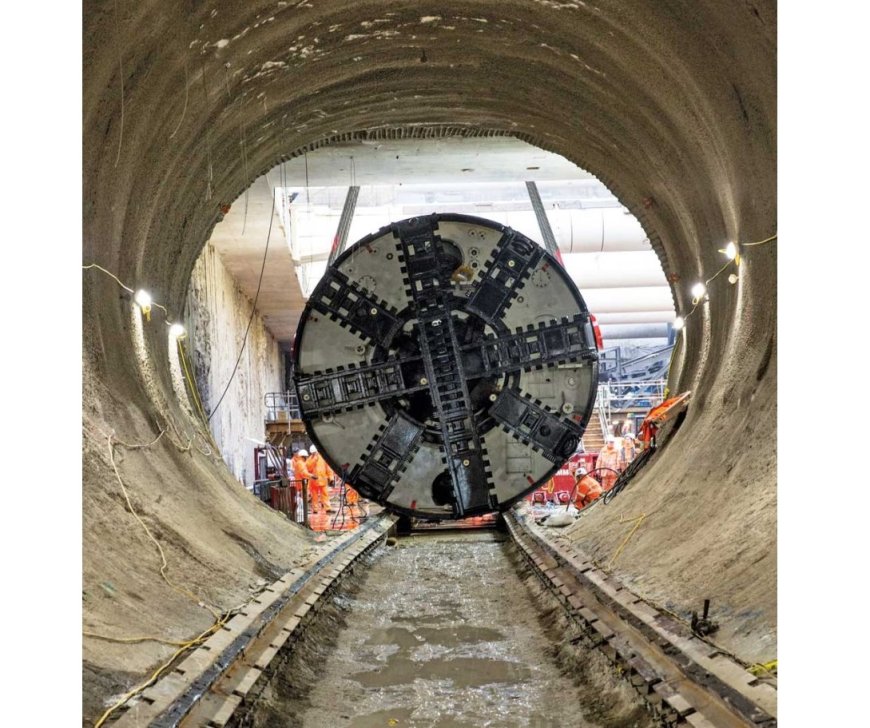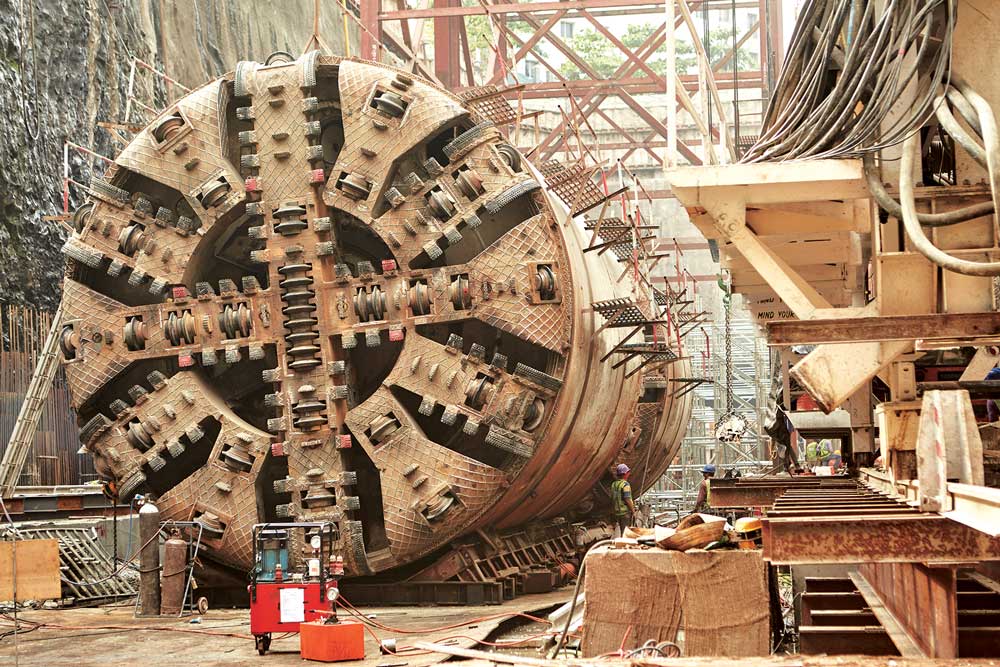DIGGING GIANT!
A tunnel boring machine is also termed a mole machine. It is mainly to excavate tunnels through the soil and hard rock. It is existing in several diameter sizes of 49 inches to 60 feet.

An increase in infrastructure in the railway, metros and road highways has been driving the growth of the tunnel boring machine (TBM) market. Equipment Times looks at the India operations, products and services, major projects underway, machine’s versatility, cost-effectiveness and performance advantages in all strata and future of TBMs in India.
A tunnel boring machine is also termed a mole machine. It is mainly to excavate tunnels through the soil and hard rock. It is existing in several diameter sizes of 49 inches to 60 feet. It comprises a hydraulic braking system, cutter head, and conveyor. The cutter head revolves 360°. Alongside the tunnel surface under huge pressure, the cutter head eliminates rocks and mud from the surface of the tunnel.
The surge in government capitalization for infrastructural growth is anticipated to drive the development of the market. On the other hand, high capitalization prices and lack of flexibility are anticipated to restrict the market growth.
Technological progression in rock cutting technology is expected to offer lucrative opportunities in the forecast period. The increase in acceptance of tunnel boring machines in the mining industry is anticipated to propel the development of the global tunnel boring machine market.
The surge in spending on road railway infrastructure and railway infrastructure growth in emerging economies such as China and India, and others, are anticipated to propel the development of the global tunnel boring machine market.
Unexpected outbreak of the COVID-19 last year had led to the execution of severe lockdown rules across numerous nations resulting in interruptions in export and import activities of tunnel boring machines. The QMI aims to offer several data of pre and post-pandemic impact on the tunnel boring machine market.
In the Covid-19 situation, several manufacturing industries in the market stopped their business manufacturing plants on account of lockdown implemented in different developing and developed economies. This stop directly impacted the sales of tunnel boring machine companies.
Additionally, the lack of raw materials and manpower impacted the supply chain of the market. On the other hand, the introduction of vaccines for Covid-19, and the reopening of manufacturing services are predictable to lead to the recovery of the tunnel boring machine market.
There are several types of machine types in the tunnel boring machine market, some of the major types are slurry TBM, earth pressure balance shield TBM, shielded TBM, multi-mode TBM, open gripper TBM, and others.
The open gripper TBM segment is the fastest-growing segment in the forecast period. The growth is on account of increasing allowance and new product presentations likely to propel the segment growth in the forecast period.
|
‘Made In India’ Tunnel Boring Machines To Be Used For Chennai Metro Phase-II Project Chennai Metro Rail Ltd. (CMRL) will use indigenous tunnel boring equipment for its Phase II project. It is in contrast to the earlier ten years, when China, Russia, and German-made machinery were used. According to CMRL officials, 12 of the 23 tunnel boring machines (TBMs) to be used in the project will be from Tamil Nadu, five from China, one from Germany, and one from Pune. Four TBMs’ current state is unknown because the contract for the section of Corridor 5 between Kolathur and Nathamuni has not been granted yet. “Of the 12 machines in Tamil Nadu, 10 will be manufactured in Chennai and two in Kancheepuram. After the remanufacturing process is complete, the company will have it certified for use from the original manufacturer after which it will be used here,” an official said, reported The Hindu. Another official stated that as the alignment is still undergoing certain alterations, the number of stations would undoubtedly change in the upcoming months. 26.7 km of Corridor 3’s 45.81 km length from Madhavaram to SIPCOT would be underground. Ten kilometers of Corridor 4, a 26-kilometer route connecting Light House and Poonamallee, will also be underground. There is another 5.8 km underground section of Corridor 5, which connects Madhavaram and Shollinganallur, which spans 47 km. The second TBM, which has passed the factory acceptance test, will shortly be transported to the building site while the first TBM has already left China and arrived in Madhavaram. Between October and June of next year, “these 19 TBMs will be commissioned for the Phase II project one after the other. The expansion of Metro Phase II is planned with a network length of 118.9 km with 128 stations. It consists of three corridors, namely Corridor -3 – From Madhavaram to SIPCOT (45.8 km), Corridor – 4 – From Lighthouse to Poonamalle Bypass (26.1 km), Corridor – 5 – From Madhavaram at Sholinganallur (47 km). The estimated cost of the project is Rs 63,246 crore. Construction is expected to be completed by the end of 2026. |
|
L&T’s Mumbai Coastal Road Project sets a world record in Tunnel Boring Larsen & Toubro, an Indian multinational engaged in EPC Projects, Hi-Tech Manufacturing and Services, today announced that their 12.19 m dia Slurry TBM (Tunnel Boring Machine), named ‘Mavala’, had achieved a world record for monthly lengths by excavating 456.72 m at the prestigious Mumbai Coastal Road Project, Package 4. Deployed from Girgaon Chowpatty, the TBM, presently the largest deployed in the country, broke the previous global record of 455.4 m for monthly tunnelling done by a 13m single shield EPB (Earth Pressure Balance) TBM. “This is a huge achievement for the entire construction industry worldwide and truly an engineering feat to be proud of,” enthused Mr. S V Desai, Whole Time Director & Senior Executive Vice President (Civil Infrastructure), L&T, describing the achievement. “We achieved this speed of tunnelling thanks to our experienced and qualified team. It had given us a huge boost to speed up construction to deliver this iconic and extremely complex project in time and with quality. I take this opportunity to thank our customer, the Municipal Corporation of Greater Mumbai (MCGM), for reposing faith in us and supporting us through this whole process, as well as our employees without whom this could not have been achieved.” he added. For the project team, this achievement reflects their success to face and overcome several challenges. To begin with, TBM ‘Mavala’, named after infantry warriors in Shivaji’s army, was delivered during the height of the pandemic and since external experts could not travel, the team took it upon themselves to assemble the TBM with only some ‘virtual’ help. Weighing approximately 2,500 tonnes, the TBM was then lowered into the launching shaft in a fully assembled form. Another innovative method they adopted was to ‘rotate’ the TBM inside the shaft to start the second tunnel construction which saved them several months to dis-assemble, lift, transport, re-assemble & lower the TBM at a new location. About the Mumbai Coastal Road Project (MCRP): Phase-1 of MCRP is a 9.98 km section from Princess Street Flyover at Marine Lines to the Worli end of the Bandra-Worli Sea Link (BWSL) involving sea front development and is a first-of-its-kind in India. The project is divided into 3 Packages viz. Package-I – From Amarsons Garden till Baroda Palace, Package-II – From Baroda Palace connecting it to Bandra Worli Sea Link & Package-IV – From Princess Street Flyover at Marine Lines to Priyadarshini Park. L&T is executing Packages I & IV for MCGM involving the construction of a 3.82 km long section over reclaimed land from Priyadarshini Park to Baroda Palace and interchanges at Amarson Garden and Haji Ali. Package IV involves the construction of a 2 km long twin bored tunnel along with cut & cover, ramp, etc. to form a combined road length of 4.06 km. When completed, it would be the largest and deepest bored road tunnel in India. |
An increase in infrastructure in the railway and road highways is projected to drives the growth of the tunnel boring machine market. In addition, government investment in railway pipeline projects is projected to cater the tunnel boring machine market growth. For instance, in July 2019, the Italian government spent $33.79 billion on a railway infrastructure project. Tunnel boring machine is used for the water pipeline project, hydropower project, and pipelines for oil & gas, and other projects, which in turn increases the demand for tunnel boring machine.
An increase in rapid urbanization and industrialization among developing countries such as India, China, and others are projected to boost the tunnel boring machine market growth.
Tunnel boring machine manufacturers focus on micro-tunneling activities. This is projected to surge the demand for tunnel boring machines, which is anticipated to drive the growth of the tunnel boring machine market. Moreover, the increase in adoption of tunnel boring machines, in the mining industry, is projected to cater to the growth of the tunnel boring machine market.
However, high investment cost and lack of flexibility are the factors anticipated to hamper the growth of the tunnel boring machine market. In addition, fluctuation in raw material prices is projected to hamper the growth of the global tunnel boring machine market. For instance, in February 2020, the U.S. administration increased tariffs on variable steel and aluminum imports. This range increase includes 10% surge in aluminum imports, and a 25% rise in steel imports, which have negatively affected the U.S. manufacturing sector, and, in turn, the overall economy of the country. Furthermore, technological advancements in the tunnel boring machine with automation, and rock cutting technology are projected to provide lucrative opportunities for the growth of the tunnel boring machine market.
Terratec delivers new EPBM for Chennai Metro Rail project…
Terratec has supplied the third of five ordered Earth Pressure Balance Tunnel Boring Machines (EPBMs) for the Chennai Metro Rail project in the Indian state of Tamil Nadu.
The 6.61m diameter machine will be used by Tata Projects to carry out underground works on Chennai Metro Rail Phase-II Corridors.
As part of the Chennai Metro Rail tunnelling contract, the new tunnel boring machines (TBMs) will be used for the construction of Phase Two – Corridor Three from Venugopal Nagar Station to Kellys Station.
The scope of the work includes the building of 18km of bored tunnels. Terratec is supplying five out of the seven TBMs needed for the package. At the start of this year, Terratec began supplying the TBMs.
The first TBM S96, which was delivered on-site, is being assembled. It will shortly deliver the second TBM S97, while the third TBM S98 was dispatched after the completion of its factory acceptance test (FAT).
Industry leaders signals a booming economy….
 Kapil Bhati, Managing Director, Robbins Tunneling & Trenchless Technology, Robbins in India has been existing since 2005 and have worked in many projects of Metro, Irrigation, hydro and water transfer tunnels. Robbins TBM’s has finished Projects in Delhi Metro phase II, Jaipur Metro and Water Transfer tunnel of 8.3Km in Mumbai establishing an Indian tunnelling record of 870 m in a month and completed the entire tunnelling in 18 months. Apart from this, Robbins have supplied 2 X 10m Double shield Hard Rock machines for Alimineti Madhava Reddy project and running with the expert crew of Robbins India on per meter basis which have completed 33km from total of 43.5Km. said, “
Kapil Bhati, Managing Director, Robbins Tunneling & Trenchless Technology, Robbins in India has been existing since 2005 and have worked in many projects of Metro, Irrigation, hydro and water transfer tunnels. Robbins TBM’s has finished Projects in Delhi Metro phase II, Jaipur Metro and Water Transfer tunnel of 8.3Km in Mumbai establishing an Indian tunnelling record of 870 m in a month and completed the entire tunnelling in 18 months. Apart from this, Robbins have supplied 2 X 10m Double shield Hard Rock machines for Alimineti Madhava Reddy project and running with the expert crew of Robbins India on per meter basis which have completed 33km from total of 43.5Km. said, “
Manoj Garg, Managing Director, Herrenknecht India, says, “Modern tunnel boring machines and construction technologies make it possible to build routes that run very close to ideal lines, bringing a real breakthrough for routes that would have been inconceivable in the past. The machines used are always designed for the purpose in question in each case depending, for example, on the geology, hydrology, the diameter or the construction site circumstances. In comparison to other methods, the potential environmental impacts in terms of noise, dust and visual on sensitive receives are significantly less, and are restricted to those located near the launching and retrieval shafts. Compared to the cut-and-cover approach, disturbance to local traffic and associated environmental impacts and the quantity of C&D materials generated, are much reduced.”
says, “Modern tunnel boring machines and construction technologies make it possible to build routes that run very close to ideal lines, bringing a real breakthrough for routes that would have been inconceivable in the past. The machines used are always designed for the purpose in question in each case depending, for example, on the geology, hydrology, the diameter or the construction site circumstances. In comparison to other methods, the potential environmental impacts in terms of noise, dust and visual on sensitive receives are significantly less, and are restricted to those located near the launching and retrieval shafts. Compared to the cut-and-cover approach, disturbance to local traffic and associated environmental impacts and the quantity of C&D materials generated, are much reduced.”
Gulshan Gill, Managing Director, Terratec India,  said, “Terratec is well-known in India for its high quality of products and
said, “Terratec is well-known in India for its high quality of products and
services to the tunnelling industry. Terratec has developed TBMs that can accommodate very tight curves, 43.7m-radus on a 2% up-grade trajectory.
These TBM machines can only be designed and operated by a highly qualified engineering team. Terratec provided dual mode TBMs for the Mumbai Metro.
In a busy city like Mumbai, these TBMs performed admirably, excavating 300+/month and 23.78m in 24 hours. Terratec always provides customized solutions for projects based on the project requirement.”

Hits: 18








